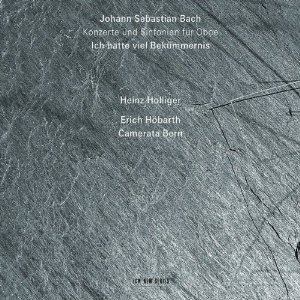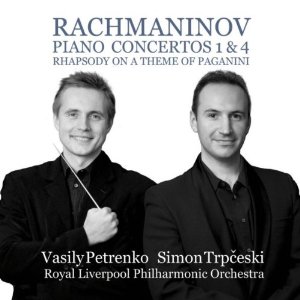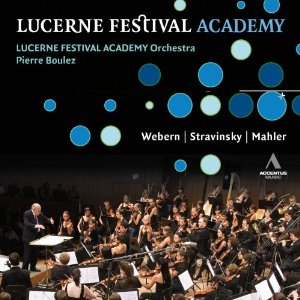Classical CDs Weekly: Bach, Mahler, Rachmaninov, Webern | reviews, news & interviews
Classical CDs Weekly: Bach, Mahler, Rachmaninov, Webern
Classical CDs Weekly: Bach, Mahler, Rachmaninov, Webern
Boulez's invigorating Mahler, Holliger's benign Bach and Trpceski's exciting Rachmaninov
A legendary septuagenarian wind player from Switzerland returns to the repertoire with which he made his name 50 years ago, and there's an exciting live reading of a gloomy fin-de-siècle symphony conducted by a contemporary French giant. The same conductor also treats us to a sparkling Stravinsky rarity, and a youthful duo lighten the mood with some Russian fireworks on Merseyside.
 Bach: Ich hatte viel Bekümmernis - Concertos and Sinfonias for Oboe Heinz Holliger (oboe), Camerata Bern/Erich Höbarth (ECM)
Bach: Ich hatte viel Bekümmernis - Concertos and Sinfonias for Oboe Heinz Holliger (oboe), Camerata Bern/Erich Höbarth (ECM)
None of Bach’s original concertos for oboe survive in their original form; yet it’s now recognised that many of the composer’s keyboard concertos had their origins in pieces for solo winds. So academics have been able to authentically reconstruct these ‘lost’ works, and they convince on all levels. Swiss oboist and musical polymath Heinz Holliger convincingly argues that the solo parts in these concertos can only sound idiomatic when played on oboe or oboe d’amore, and hearing them played alongside instrumental movements from cantatas featuring prominent oboe writing strengthens his case. Holliger’s career has now embraced conducting and composition – an ECM disc showcasing his music will be reviewed in a few weeks – but at the age of 72 he’s still playing the oboe with minimal effort.
He uses an oboe d’amore in the A major concerto BVW 1055, better known as a solo keyboard work. Having the solo part reduced to a single, clean line makes so much sense; it’s a kind of musical de-cluttering, and the oboe d’amore’s plangent, darker colours make the piece more conversational and intimate. Holliger is teamed with violinist Erich Höbarth in the BWV 1060 Double Concerto, who also directs the Camerata Bern in stylish, historically informed accompaniments. Bach’s transcription of the D minor concerto by Alessandro Marcello is enjoyably flamboyant, but it’s the cantata movements that I’ll return to most often, with Holliger floating in splendour over Bach’s grinding bass lines. Sample the Sinfonia from BWV 12 and wallow in exquisite melancholy.
 Rachmaninov: Piano Concertos 1 and 4, Rhapsody on a Theme of Paganini Royal Liverpool Philharmonic Orchestra/Vasily Petrenko, with Simon Trpčeski (Avie)
Rachmaninov: Piano Concertos 1 and 4, Rhapsody on a Theme of Paganini Royal Liverpool Philharmonic Orchestra/Vasily Petrenko, with Simon Trpčeski (Avie)
Vasily Petrenko and Simon Trpčeski complete their cycle of Rachmaninov’s music for piano and orchestra in some style. Trpčeski seems to relish the edgier, mercurial aspects to these three works, and his approach makes the neglected First Concerto really glitter. We’re a world away from the more familiar Second and Third Concertos – the cantabile melodies are largely absent and there’s an exuberant, loveable flashiness about the work. Starting with doomy Tchaikovskian fanfares which suggest a tongue-in-cheek response to Grieg’s Piano Concerto, the mood quickly lightens. Trpčeski is alive to the sheer fun to be had, and his impetuosity is neatly matched by Petrenko’s Liverpool players. The last movement’s capricious changes of metre here sound unerringly modern, but the slushy lyrical interlude is treated with tender affection. It’s an unpretentious minor masterpiece, and so much more fun than the two concertos which followed.
As is the even rarer Fourth Concerto, premiered unhappily in 1927. Richard Bratby’s entertaining sleeve note reminds us that this is the work of a composer long established in the United States, who’d attended the premiere of Gershwin’s Rhapsody in Blue a few years previously. The mood of bittersweet nostalgia is beautifully articulated, but Petrenko and Trpčeski can inject plenty of exhilarating swagger when required. My favourite moment comes a minute before the close of the final movement – a sublime, slightly hammy climax which suggests a passionate farewell to the music which had made Rachmaninov famous. It really does sound sensational here, the Mantovani-style strings soaring over sonorous lower brass. It’s wonderful.
The better-known Paganini Rhapsody closes the disc. Rachmaninov’s craft and intelligence shine through, in a witty, percussive reading. Avie’s sound, recorded in Liverpool’s Philharmonic Hall, is refulgent, warm and detailed.
 Webern, Stravinsky, Mahler Lucerne Festival Academy Orchestra/Pierre Boulez (Accentus)
Webern, Stravinsky, Mahler Lucerne Festival Academy Orchestra/Pierre Boulez (Accentus)
A recording debut for Pierre Boulez’s Lucerne Festival Academy Orchestra – as with Dudamel’s Simón Bolivar Orchestra, calling this lot a youth orchestra is probably inaccurate, with its members in their late teens and early twenties. They come from music colleges mostly in mainland Europe and the US; a scan through the list of players in the CD booklet reveals that only two are from the UK. The performances were recorded at concerts given in 2010, and they’re uniformly excellent, making this a worthwhile purchase despite the unusual programme.
The welcome rarity is the suite from Stravinsky’s seldom-performed 1914 opera, The Song of the Nightingale. It’s an alluring work, though nothing in the piece quite lives up to the promise of the spectacular opening flourish. Boulez’s players revel in the music’s quixotic twists and turns, and there’s an attractive, smoky trumpet solo near the close.
We’re on more familiar, if less comfortable ground with Webern’s chilly, oblique Op 30 Variations; seven minutes of gnomic, fragmentary strangeness. Boulez does make the work sound both musical and logical and he does give us a terrific reading of the Op 1 Passacaglia. It’s romantic, painful and brilliantly played, and an ideal curtain-raiser for Mahler’s Sixth Symphony.
Boulez doesn’t always convince in Mahler, but the Sixth’s tighter, classical structure suits his unsentimental, brusque approach. The inner movements are swift, but cannily paced, and I’m glad that Boulez chooses to play Scherzo before the Andante moderato. The Finale’s hammer blows are titanic in impact, and there’s a reckless, edge-of-seat quality to the orchestral playing. It’s very exciting, and the detailed, close recording helps.
Share this article
more Classical music
 Bell, Perahia, ASMF Chamber Ensemble, Wigmore Hall review - joy in teamwork
A great pianist re-emerges in Schumann, but Beamish and Mendelssohn take the palm
Bell, Perahia, ASMF Chamber Ensemble, Wigmore Hall review - joy in teamwork
A great pianist re-emerges in Schumann, but Beamish and Mendelssohn take the palm
 First Persons: composers Colin Alexander and Héloïse Werner on fantasy in guided improvisation
On five new works allowing an element of freedom in the performance
First Persons: composers Colin Alexander and Héloïse Werner on fantasy in guided improvisation
On five new works allowing an element of freedom in the performance
 First Person: Leeds Lieder Festival director and pianist Joseph Middleton on a beloved organisation back from the brink
Arts Council funding restored after the blow of 2023, new paths are being forged
First Person: Leeds Lieder Festival director and pianist Joseph Middleton on a beloved organisation back from the brink
Arts Council funding restored after the blow of 2023, new paths are being forged
 Classical CDs: Nymphs, magots and buckgoats
Epic symphonies, popular music from 17th century London and an engrossing tribute to a great Spanish pianist
Classical CDs: Nymphs, magots and buckgoats
Epic symphonies, popular music from 17th century London and an engrossing tribute to a great Spanish pianist
 Sheku Kanneh-Mason, Philharmonia Chorus, RPO, Petrenko, RFH review - poetic cello, blazing chorus
Atmospheric Elgar and Weinberg, but Rachmaninov's 'The Bells' takes the palm
Sheku Kanneh-Mason, Philharmonia Chorus, RPO, Petrenko, RFH review - poetic cello, blazing chorus
Atmospheric Elgar and Weinberg, but Rachmaninov's 'The Bells' takes the palm
 Daphnis et Chloé, Tenebrae, LSO, Pappano, Barbican review - lighting up Ravel’s ‘choreographic symphony’
All details outstanding in the lavish canvas of a giant masterpiece
Daphnis et Chloé, Tenebrae, LSO, Pappano, Barbican review - lighting up Ravel’s ‘choreographic symphony’
All details outstanding in the lavish canvas of a giant masterpiece
 Goldscheider, Spence, Britten Sinfonia, Milton Court review - heroic evening songs and a jolly horn ramble
Direct, cheerful new concerto by Huw Watkins, but the programme didn’t quite cohere
Goldscheider, Spence, Britten Sinfonia, Milton Court review - heroic evening songs and a jolly horn ramble
Direct, cheerful new concerto by Huw Watkins, but the programme didn’t quite cohere
 Marwood, Power, Watkins, Hallé, Adès, Bridgewater Hall, Manchester review - sonic adventure and luxuriance
Premiere of a mesmeric piece from composer Oliver Leith
Marwood, Power, Watkins, Hallé, Adès, Bridgewater Hall, Manchester review - sonic adventure and luxuriance
Premiere of a mesmeric piece from composer Oliver Leith
 Elmore String Quartet, Kings Place review - impressive playing from an emerging group
A new work holds its own alongside acknowledged masterpieces
Elmore String Quartet, Kings Place review - impressive playing from an emerging group
A new work holds its own alongside acknowledged masterpieces
 Gilliver, LSO, Roth, Barbican review - the future is bright
Vivid engagement in fresh works by young British composers, and an orchestra on form
Gilliver, LSO, Roth, Barbican review - the future is bright
Vivid engagement in fresh works by young British composers, and an orchestra on form
 Josefowicz, LPO, Järvi, RFH review - friendly monsters
Mighty but accessible Bruckner from a peerless interpreter
Josefowicz, LPO, Järvi, RFH review - friendly monsters
Mighty but accessible Bruckner from a peerless interpreter
 Cargill, Kantos Chamber Choir, Manchester Camerata, Menezes, Stoller Hall, Manchester review - imagination and star quality
Choral-orchestral collaboration is set for great things
Cargill, Kantos Chamber Choir, Manchester Camerata, Menezes, Stoller Hall, Manchester review - imagination and star quality
Choral-orchestral collaboration is set for great things

Add comment